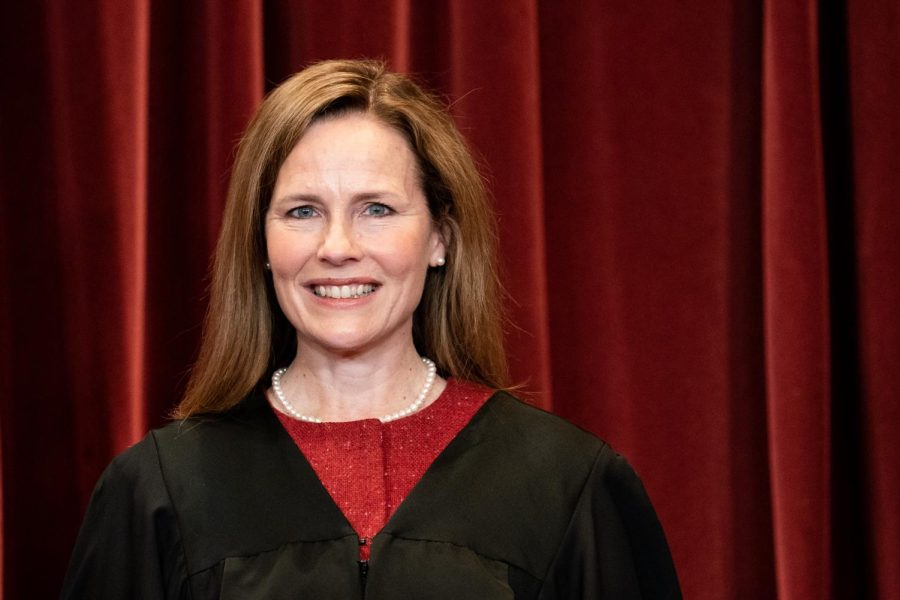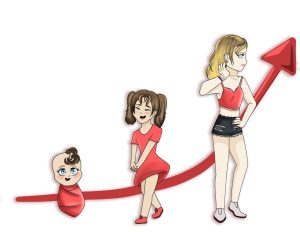[Opinion] Supreme Court Justice Amy Coney Barrett confirms worst fears
Tribune News Service
Associate Justice Amy Coney Barrett stands during a group photo of the Justices at the Supreme Court in Washington, D.C. (Erin Schaff/Pool/Getty Images/TNS)
January 10, 2022
Supreme Court Justice Amy Coney Barrett has confirmed the worst fears of millions of Americans as the Supreme Court heard oral arguments in the case of Dobbs v. Jackson Women’s Health on Wednesday, Dec. 1.
Justice Barrett replaced the late Supreme Court Justice Ruth Bader Ginsburg, as former President Donald Trump’s SCOTUS nominee. She was confirmed on Oct. 26, 2020 in a vote of 52-48. Senator Susan Collins was the only Republican to dissent in her confirmation and no Democrats voted to confirm Barrett.
Democrats were largely critical of Barrett’s nomination, expressing anxieties and trepidation over potential consequences, particularly regarding abortion rights, LGBTQ+ rights and the future of the Affordable Care Act.
“We don’t want to allow [Trump] to change the subject, which is what [Republicans] are always doing,” former member of the Biden Transition Team and current Transportation Secretary Pete Buttigieg said. “There are all kinds of interesting questions on the future of the American judiciary, but right now, as we speak, the pre-existing condition coverage of millions of Americans might depend on what is about to happen in the Senate with regard to this justice. My marriage might depend on what is about to happen in the Senate […] So many issues are on the line.”
Buttigieg, who married his husband Chasten in 2018, was referencing the statement put out by Justices Samuel Alito and Clarence Thomas that announced their plans to repeal Obergefell v. Hodges, a landmark Supreme Court case that stated the Constitution legally allows for same-sex marriage.
Democrats feared if Barrett was confirmed, Republicans would have success, if or when they attempted to repeal Obergefell v. Hodges. During her confirmation hearing, she referred to sexual orientation as “sexual preference,” an outdated and offensive term because it implies sexual orientation is a choice.
The Human Rights Campaign, the largest LGBTQ advocacy group in the United States, opposed her nomination, citing her long history of being anti-LGBTQ.
“Put queer people on television tonight. Every network. We’ve got some things to say about this sham process and a judge who will most certainly vote to harm our community,” Chasten Buttigieg tweeted the night Barrett was confirmed.
Republicans have made no attempt to hide their endeavors to repeal Obergefell v. Hodges or Roe v. Wade. In the third presidential debate of 2016, former President Trump stated he’d appoint pro-life justices and that because of this, Roe v. Wade would inevitably be overturned.
Trump did keep his promises to his supporters, nominating Justice Neil Gorsuch, Justice Brett Kavanaugh and Justice Amy Coney Barrett.
“I feel strongly that the Supreme Court needs to stand on the side of the American people, not on the side of the powerful corporations and the wealthy,” former Secretary Hillary Clinton said at the debate. “For me, that means we need a Supreme Court that will stand up on behalf of women’s rights, on behalf of the rights of the LGBT community, that will stand up and say no to Citizens United […] I feel that at this point in our country’s history, it is important that we not reverse marriage equality, that we not reverse Roe v. Wade, that we stand up against Citizens United一we stand up for the rights of people in the workplace. That we stand up and basically say一the Supreme Court should represent all of us.”
Barrett’s record suggests a long history of being anti-abortion, despite not directly answering questions on how she would rule on abortion rights during her confirmation hearings. She signed her name on a 2006 newspaper ad that opposed “abortion on demand” and voted for abortion restrictions twice. She wrote an article in 1998, calling abortion “always immoral.” She was later asked about this and clarified she was referencing the Catholic Church teaching that abortion is “always immoral.” Additionally, she signed a letter in 2015 that stated human life is “from conception to natural death.”
However, despite her record, Barrett did not make large headlines on either abortion nor LGBTQ rights over the past year一until now. Wednesday, Dec. 1, did not go well for supporters of reproductive rights, according to several legal activists.
“It seems to me that the choice is more focused would be between, say, the ability to get an abortion at 23 weeks or the state requiring a woman to go 15, 16 weeks more and then terminate rights at the conclusion,” Barrett said. “Why didn’t you address the safe haven laws and why don’t they matter?”
This take is utterly revolting and it shows a shocking lack of empathy. Pregnancy is not simple and without complications, so the notion that someone can “just go 15 or 16 weeks longer with an unwanted fetus” in their uterus and then easily put the child up for adoption is harmful.
“We don’t just focus on the burdens of parents, and neither did Roe and Casey. Instead, pregnancy itself is unique,” Julie Rikelman, the attorney for Jackson Women’s Health, said in response. “It imposes unique physical demands and risks on women and, in fact, has impact on all of their lives, on their ability to care for other children, other family members, on their ability to work.”
Third trimester symptoms include shortness of breath, exhaustion, swollen feet and ankles, itchy skin, trouble sleeping, sore gums and teeth may feel looser, as well as Braxton Hicks contractions.
Not only can these symptoms negatively impact the life of the pregnant person, childbirth is extremely dangerous. The U.S. has the highest maternal mortality rate among developed countries and it’s particularly dangerous among women of color and trans people. Black women are three to four times more likely to die during childbirth or in the months after than white, Asian or Latina women. Indigenous women are two to three times more likely.
On the otherhand, abortion has an extremely low mortality rate when done safely. In non-abortion-restrictive countries, only 1% of abortions were unsafe, in contrast to 31% of heavily-restrictive countries.
Barrett’s statements came under fire from several activists.
“Gotta say; of all the things that shook my core this week, Amy Coney Barrett’s cold-blooded calculations about how convenient it would be to cast off a child born via uninvited trauma after nine months of anxiety and the psychic horror was probably the most disturbing,” Joy-Ann Reid said. “Who is she?”
Reid’s statement is harsh, but true. Both pregnancy and putting a child up for adoption via safe haven laws are extremely traumatic processes and any person should have the option to get an abortion if they decide that path is not for them. Putting a child up for adoption is traumatic for not only the parent, but the adoptee as well. Barrett’s statement was stunning, especially as an adoptive mother herself.
“For everyone gonna say “‘just put it up for adoption,’ it’s not that easy & coming from someone who was in the foster care system, trust me foster care system is broken & it’s tough,” Simone Biles said. “Especially on the kids & young adults who age out.”
Barrett’s privileged and out of touch misconceptions have real-world consequences一consequences Democrats feared would happen since her confirmation. They’re playing out in real time now and one can only hope the Supreme Court finds some sense within themselves to make the proper decision in siding with Jackson Women’s Health. If they do not, it is doubtless that lives will be lost.










